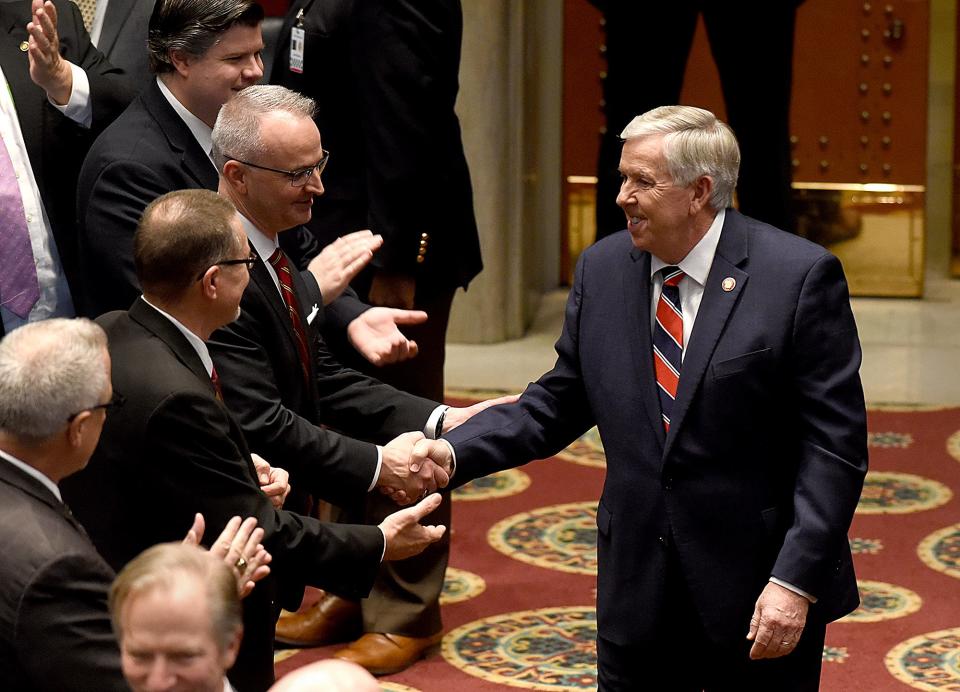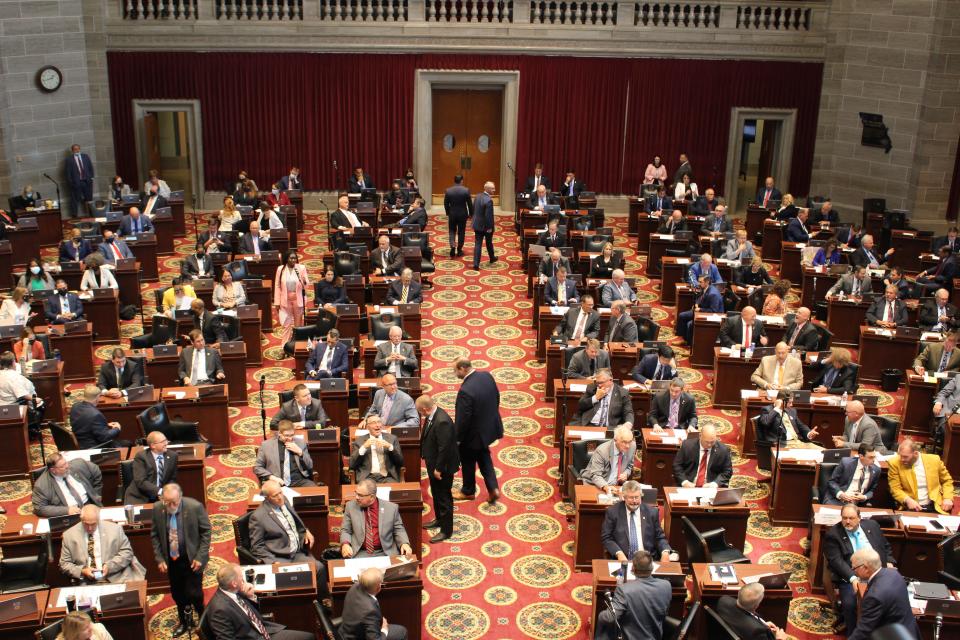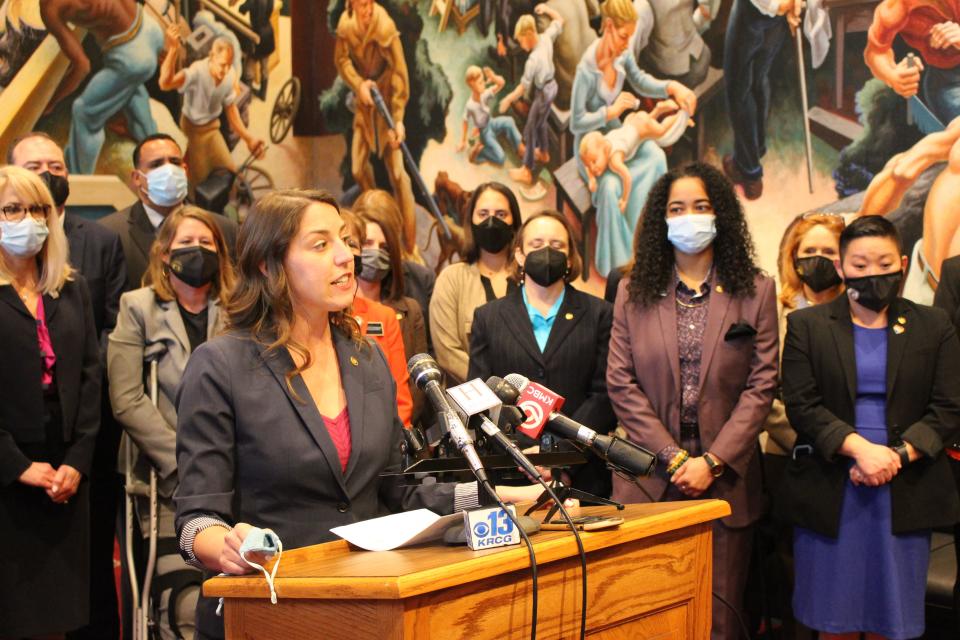Missouri House debates budget with billions of state and federal dollars up in the air
- Oops!Something went wrong.Please try again later.
JEFFERSON CITY — The Missouri House debated a budget for the upcoming fiscal year Tuesday, preparing to send a plan to the Senate that clocks in just below the governor's funding recommendation while rejecting a number of requests to use more of the state's surplus money.
Throughout more than nine hours of floor discussion, House Democrats proposed numerous expansions to a 2023-24 budget that comes during an economic surge, with billions in excess funds from state revenue and federal stimulus dollars. The Republican-led chamber was reticent to commit to spending all of it, however, shooting down most amendments and opting to leave about $1.8 billion unspent.
"This budget before us ... will be billions more than the budget before it," said Rep. Dirk Deaton, a Noel Republican who serves as vice chair of the budget committee. "And there's only so much money you can spend responsibly within a given fiscal year, and I think we've struck that balance."
Parson's original budget proposal included about $47.3 billion in spending for the fiscal year, which starts July 1; the House budget is estimated at about $46.1 billion.
Government spending: Gov. Mike Parson touts spending plans, COVID-19 response in State of the State address
One of Republican Gov. Mike Parson's spending priorities, an increase in minimum starting pay for teachers to $38,000, is not included in the House budget. Lawmakers instead opted to revive a program granting pay raises ranging from $1,500 to $5,000 to experienced teachers, at a cost of $36 million.
Other changes from Parson's recommended budget include a reduction in the amount of revenue invested in the state pension fund and $2.4 million added for Amtrak rail funding.
Medicaid, which has previously been a subject of controversy after legislators declined to increase funding under the program's expansion last year, is fully funded under the House proposal.

Some of the largest attempted spending requests came in the realm of K-12 education. Democrats, who have pushed for more of the state's surplus money to be spent, pointed to teacher pay in Missouri being among the lowest in the country, and a quarter of districts moving to four-day workweeks to combat short and strained staffs.
Rep. Peter Merideth of St. Louis, the ranking Democrat on the budget committee, proposed an amendment adding $100 million in state revenue to allow districts to increase teacher pay, with a minimum starting salary of $38,000, but it was shot down. A later attempt to provide a one-time stipend to all teachers met the same fate.
Other attempted additions related to education — $215 million for school transportation, $108 million to place social workers in schools and $250 million for tuition-free pre-K — also failed.
Lawmakers insert language restricting vaccination requirements, Planned Parenthood
Language attached to each of the 15 budget bills seeks to block taxpayer dollars from going toward "any general admission event that requires or inquires about COVID-19 vaccination status, or COVID-19 testing," with exceptions only under state statute or an emergency order.
Republicans supported the measure, which was added during committee negotiations. Rep. Cody Smith of Carthage, the budget chair, said "the technical aspects are not what I want to speak to, I want to speak to the spirit of the language, which I believe is in step with the spirit of the General Assembly."
Rep. Betsy Fogle, a Springfield Democrat who sits on the budget committee, attempted multiple times to strip the language from the bills, calling it "incredibly problematic" for universities, veterans' homes and other state-controlled or state-adjacent entities.
"What is a law if not the technical language it encompasses?" Fogle responded to Smith.
Her amendment failed by a 46-84 vote. Two of Springfield's Republicans, Reps. Alex Riley and Craig Fishel, broke from the Republican caucus and voted in favor of removing the language.
The budget was also amended to include language barring state and federal dollars from going to all Planned Parenthood facilities. The organization operates the state's last abortion clinic in St. Louis but also has clinics throughout the state that focus on reproductive and sexual health care services. A previous emergency spending bill signed by the governor contained similar language.
Federal stimulus funding
The governor's plan for spending American Rescue Plan Act funds contains a bevy of big-ticket items: construction for colleges and universities, expansion of broadband internet access and improvements to water infrastructure, among others.
The House plan pared that back significantly, with Smith, the Republican budget chair, arguing it made more sense to only allocate for one years' worth of the federal funds rather than the entirety. He said on the floor that "taking it in bite-sized pieces" would allow the legislature to more effectively spend the money, which must be appropriated by 2024.

Democrats filed a number of amendments attempting to spend more of the money, arguing that refusing to allocate the entirety could hamper state agencies in planning for projects.
"We've talked to departments ... it does make a dramatic difference to them if they have full authority or only a fraction of the authority," Merideth said. "This money has a timeline, it's for responding to COVID. Let's get it out fast."
GOP blocks spending, but Senate may spend anyway
Republicans frequently blocked debate and votes on Democrats' spending requests by invoking specific House rules which cite that any increase using the state's general revenue must also result in a decrease elsewhere.
Minority Leader Crystal Quade, a Springfield Democrat, attempted at the beginning of debate to suspend the rule, arguing that the rule was a relatively recent phenomenon that came about during an economic downturn. She said the House's failure to allocate the money would hand the Senate "a blank check" when it tackles the budget, making changes as they see fit before the two chambers likely meet in a conference committee.

"They're going to appropriate every dime of that money," Quade said. "If you think senators over there aren't going to spend this money, you guys must be new here. ... I'm not sure I want them making these decisions over billions of dollars."
Leadership in the Senate last week indicated frustration with the other end of the building. Senate Majority Leader Caleb Rowden, a Columbia Republican, said last week he believed the House budget process had been "fairly irresponsible," and that "the Senate usually wins the budget process."
"My assumption is either they don't know what they're doing or they're trying to back us into a corner because of the time constraints," Rowden said.
Senate Minority Leader John Rizzo, a Democrat from Independence, said "there's going to be a lot of differences" between the two chambers and that it was going to be a crunch to meet the constitutional deadline to deliver the budget to the governor's desk.
If necessary, lawmakers can return for a special session to finalize the bills. The House will take a final vote on the budget before it heads to the Senate. Six weeks remain in the regular legislative session.
Galen Bacharier covers Missouri politics & government for the News-Leader. Contact him at gbacharier@news-leader.com, (573) 219-7440 or on Twitter @galenbacharier.
This article originally appeared on Springfield News-Leader: House debates budget with billions of state, federal dollars at stake

